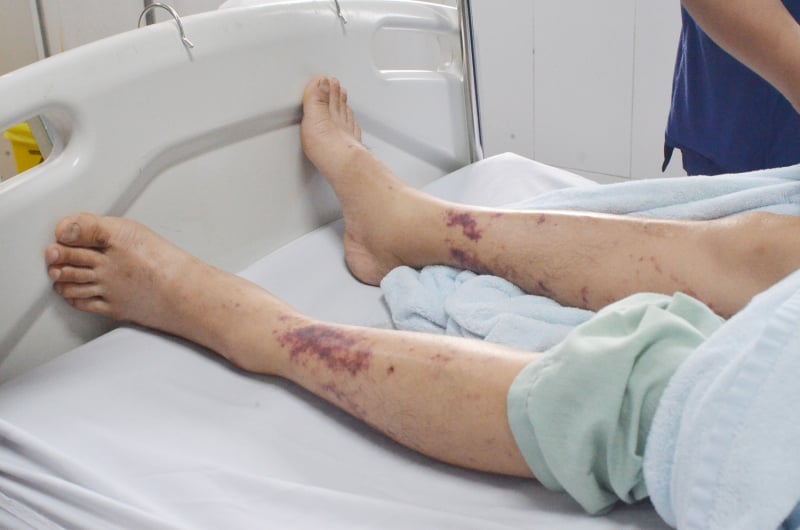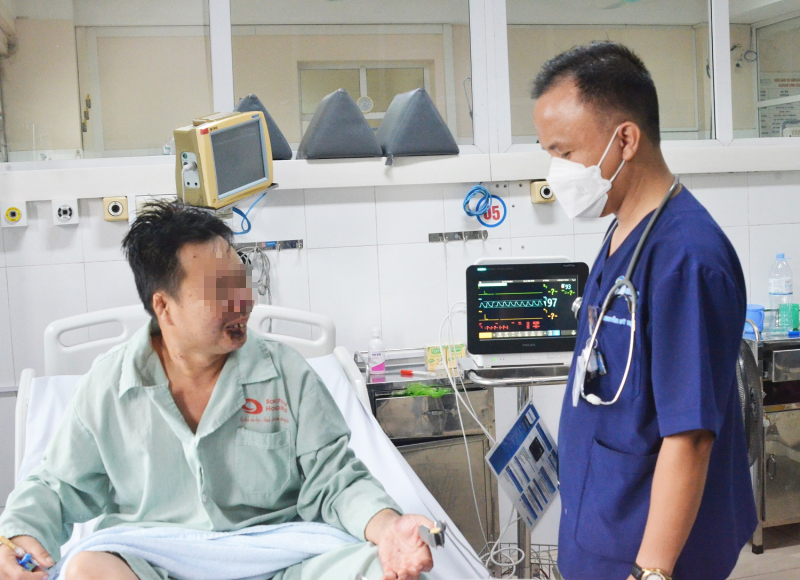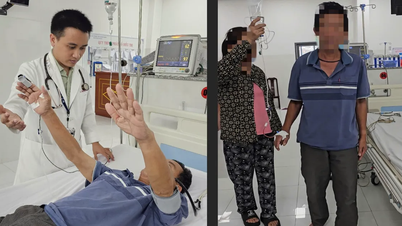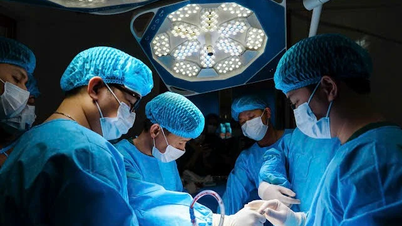On August 2, information from Bai Chay Hospital ( Quang Ninh ) said that doctors at Bai Chay Hospital had just saved the life of a patient with sepsis, septic shock, and multiple organ failure complications due to streptococcus suis infection.

Scattered petechiae under the patient's skin
Patient PVB (47 years old, in Dai Yen Ward, Ha Long City, Quang Ninh) had frequent loose stools, intermittent abdominal pain around the navel, fatigue, and was taken to the emergency room by his family in a state of low blood pressure, purple veins all over his body, and scattered subcutaneous bleeding. Three days before, the patient bought pork, brought it home, and prepared it himself.
Test results showed that the patient had a severe infection and multiple organ failure. Based on clinical and paraclinical examinations, the patient was diagnosed with septic shock, sepsis, and was monitored for streptococcus suis.
Upon admission, doctors treated the patient with many active resuscitation measures such as mechanical ventilation, maintaining vasopressors, combined antibiotics, blood filtration, fluid and electrolyte replacement, etc.
Blood culture results confirmed that the patient was positive for Streptococcus suis. After 8 days of intensive care, the patient was out of danger, his health was stable, and his infection index improved.

After 8 days of intensive care, the patient was out of danger.
Streptococcus suis ( scientific name Streptococcus suis) usually resides in the upper respiratory tract, especially in the nose, digestive tract and genitals of pigs. The route of infection can be through the digestive tract entering the body when the patient eats raw blood pudding, raw meat or through contact with blood, secretions, raw pork through scratches from the skin, mucous membranes of humans.
Dr. Nguyen Sy Manh, Department of Intensive Care and Anti-Poison, Bai Chay Hospital, said: "Patients infected with Streptococcus suis include 3 forms: Sepsis, purulent meningitis or a combination of both. Depending on the form, the disease progresses severely or mildly, in some cases the infection is severe from the beginning. Symptoms of the disease usually appear after a few hours to 4-5 days, in some cases the incubation period is up to 14 days depending on each person's constitution. The initial symptoms can be mild, non-specific such as abdominal pain, fever, nausea, vomiting and loose stools... which can easily make many people subjective about common digestive disorders and food poisoning, so they go to the hospital late. More severe cases include headache, high fever, vomiting, decreased consciousness, lethargy, necrotic rash on the skin due to sepsis, purulent meningitis due to Streptococcus suis. If not treated promptly, some cases of patients infected with Streptococcus suis have a rapid and severe progression, with symptoms of septic shock, multiple organ failure organs, rapid death. Sequelae of meningitis caused by Streptococcus suis can cause deafness, headaches...".
According to doctors at Bai Chay Hospital, patients infected with Streptococcus suis often face many life-threatening complications, long and expensive treatment times, and severe sequelae. Patients who have been infected with Streptococcus suis can still get it again. Therefore, through this patient's case, doctors advise people not to eat raw blood pudding, pig intestines, and undercooked pork, and not to eat dead or sick pigs.
For farmers and slaughterers who regularly come into contact with secretions, blood, and raw pork, it is necessary to practice personal hygiene, wear protective gear, keep hands free of scratches, and wash hands immediately after contact with pigs to avoid bacteria from entering. If there are signs of high fever, headache, or nausea, you should go to a medical facility immediately for advice.
Source link



![[Photo] 60th Anniversary of the Founding of the Vietnam Association of Photographic Artists](/_next/image?url=https%3A%2F%2Fvphoto.vietnam.vn%2Fthumb%2F1200x675%2Fvietnam%2Fresource%2FIMAGE%2F2025%2F12%2F05%2F1764935864512_a1-bnd-0841-9740-jpg.webp&w=3840&q=75)

![[Photo] National Assembly Chairman Tran Thanh Man attends the VinFuture 2025 Award Ceremony](/_next/image?url=https%3A%2F%2Fvphoto.vietnam.vn%2Fthumb%2F1200x675%2Fvietnam%2Fresource%2FIMAGE%2F2025%2F12%2F05%2F1764951162416_2628509768338816493-6995-jpg.webp&w=3840&q=75)





































































































Comment (0)